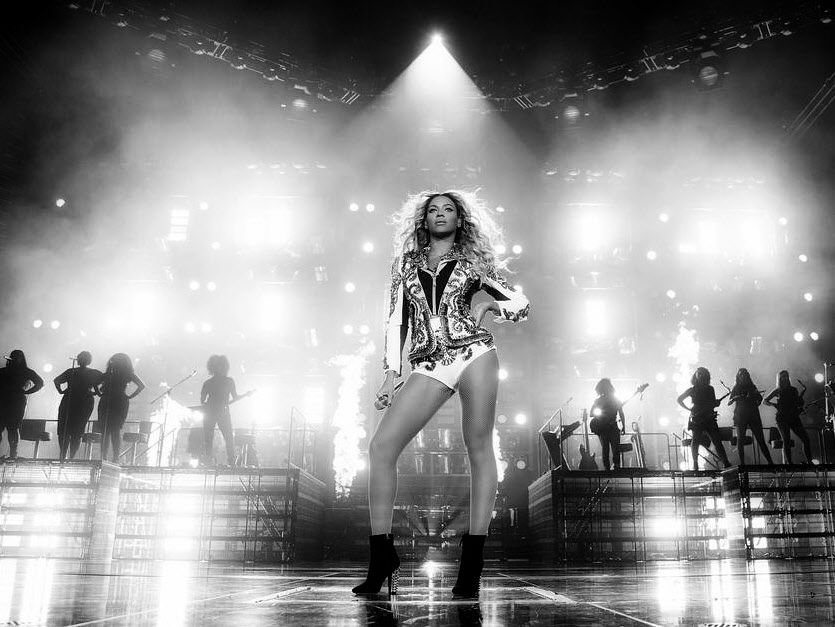GOOGLE BEYONCÉ. Taylor Swift. Rihanna. Katy Perry. Nicki Minaj.
Read the Facebook and Twitter commentary on the articles you find. I’ll guarantee half of it ranges from “OMGGGGG, WHO CARES??????” to “She’s such a bad role model.”
Sadly, a large portion of those negative comments will come from self-identified feminists who don’t think that celebrity is “feministing” properly. You’ll find these arguments come, by and large, from white individuals whose feminism, deeply held as it may be, never became intersectional. So when Rihanna kidnaps a woman in her “BBHMM” video, it’s inexcusable. Nicki Minaj twerking like a master in “Anaconda” is disgusting. Beyoncé calls herself a feminist: God, does she even know the meaning of the word?
Dear fellow white feminists: reading Simone de Beauvoir, Virginia Woolf, and Lena Dunham will get you far, but if your “feminism … celebrates Tina Fey, Lily Allen and Lena Dunham, but tears down Nicki Minaj, Beyoncé and Rihanna,” you’ve still got a lot to learn in order to be inclusive. Google intersectionality.
That isn’t to say that white pop stars don’t receive their own share of negative criticism from self-proclaimed feminists on social media. Sexual policing of women comes from all corners, even the ones that should be the most sex-positive. However, although a great deal of the negativity leveled at female celebrities comes in regard to their potential for sexual objectification, much of it derives from one simple assumption: that they are women and, therefore, do not matter.
I know. It makes your skin crawl to hear it, right? The immediate, reactionary response to a statement like that begins with, “Now wait just a minute.” I’ll be the first to say that most of the people complaining about celebrity gossip coverage probably aren’t being intentionally sexist. That doesn’t change the facts, though. The majority of hatred for women like Miley Cyrus and Kim Kardashian stems from anti-woman culture, and here’s how.
So you’re scrolling through your social media feed and you see a write-up about the latest Taylor Swift gossip. You think, Oh my God! Aren’t there more important things to talk about than celebrities? Who the hell cares about Taylor Swift?
Well, first off, while there are much more important things we could talk about than other people, what is and is not important is relative. Climate change is a huge issue affecting every living thing on the planet, but if you ask an impoverished mother in Bangui, I’ll bet it isn’t at the top of her shortlist.
And secondly, a lot of people care. Taylor Swift is a person, whether you like her or not. She has legions of fans, friends, and family members who love her.
Perhaps the funniest thing is that these anti-celebrity comments are found on social networks with content-aggregating systems based on relevancy: like Facebook, for example, which tries very hard to tailor the posts you see to your interests. This means that you’re seeing Taylor Swift because you’ve liked, shared, or talked about her. Maybe you Googled her, or watched a few of her videos on YouTube. So, according to Facebook’s algorithms, you care.
Here’s the crucial point, though: you don’t see these kinds of comments on updates about male celebrities. Take, for example, this post from Polygon’s Facebook account, titled “Breaking: Ryan Reynolds in official Deadpool costume is as sexy as you hoped.” Some of the highest rated comments include “I feel like he was born for this role”; “Never really was a big fan of Ryan Reynolds, but this role is so perfect for him.”; and “Great!! Finally like the comics.”
Not one person is protesting that we have better things to focus on than comic book movies. No one is saying that Ryan Reynolds doesn’t matter. Obviously, Deadpool is about as important as pop music; both are cultural relics without much literary merit. But Ryan Reynolds’ Playgirl-esque pose as Deadpool somehow goes without disparagement, while a Guardian article hashing out the intersectional issues in the Nicki/Taylor/Katy feud has top comments like “WHO CARES” and “Who gives a f**k what Katy Perry thinks about anything?”
Think about it: when was the last time you saw Fashion Week given a segment on your local news, à la Super Bowl? Feminine interests and fields, such as pop music and fashion, receive less attention and credibility than sports, technology, and other “masculine” pursuits. By extension, female pop stars and fashionistas — and their fans — are seen as frivolous and vapid, deserving of little attention and capable of producing nothing of merit. Barring legitimate cultural criticisms, the vitriol lobbed at these women stems from anti-woman roots.
Some people want to change the world, some want a warm place to sleep, and some just want to read celebrity gossip; is that so wrong?

















